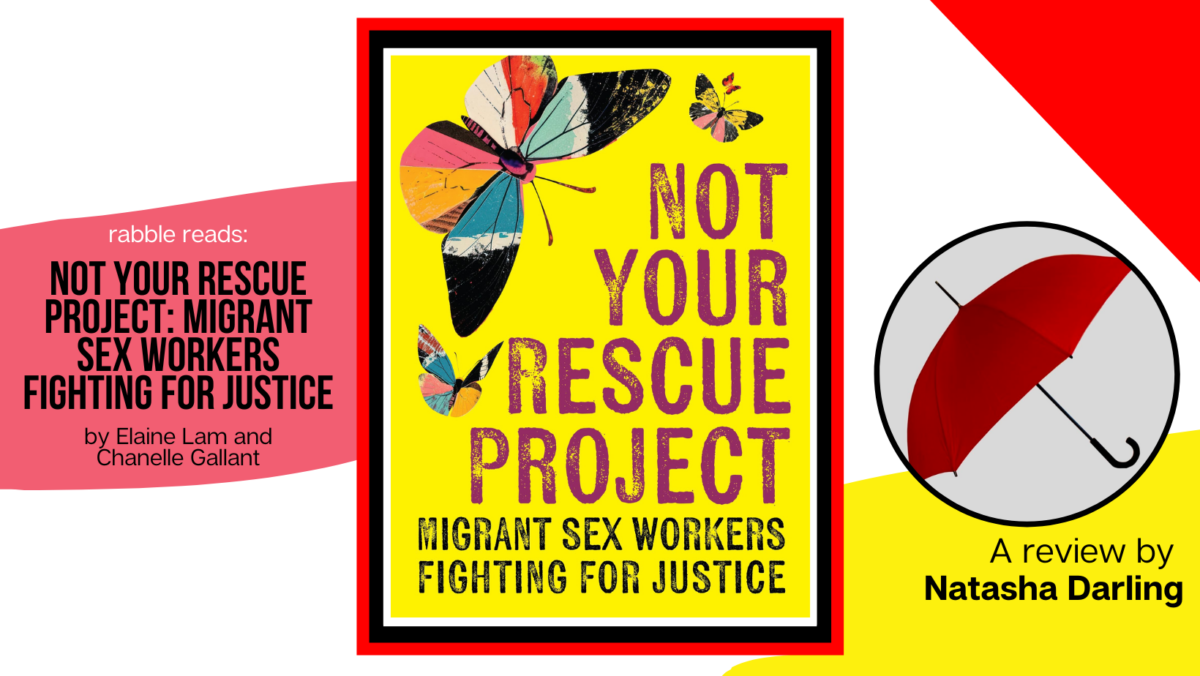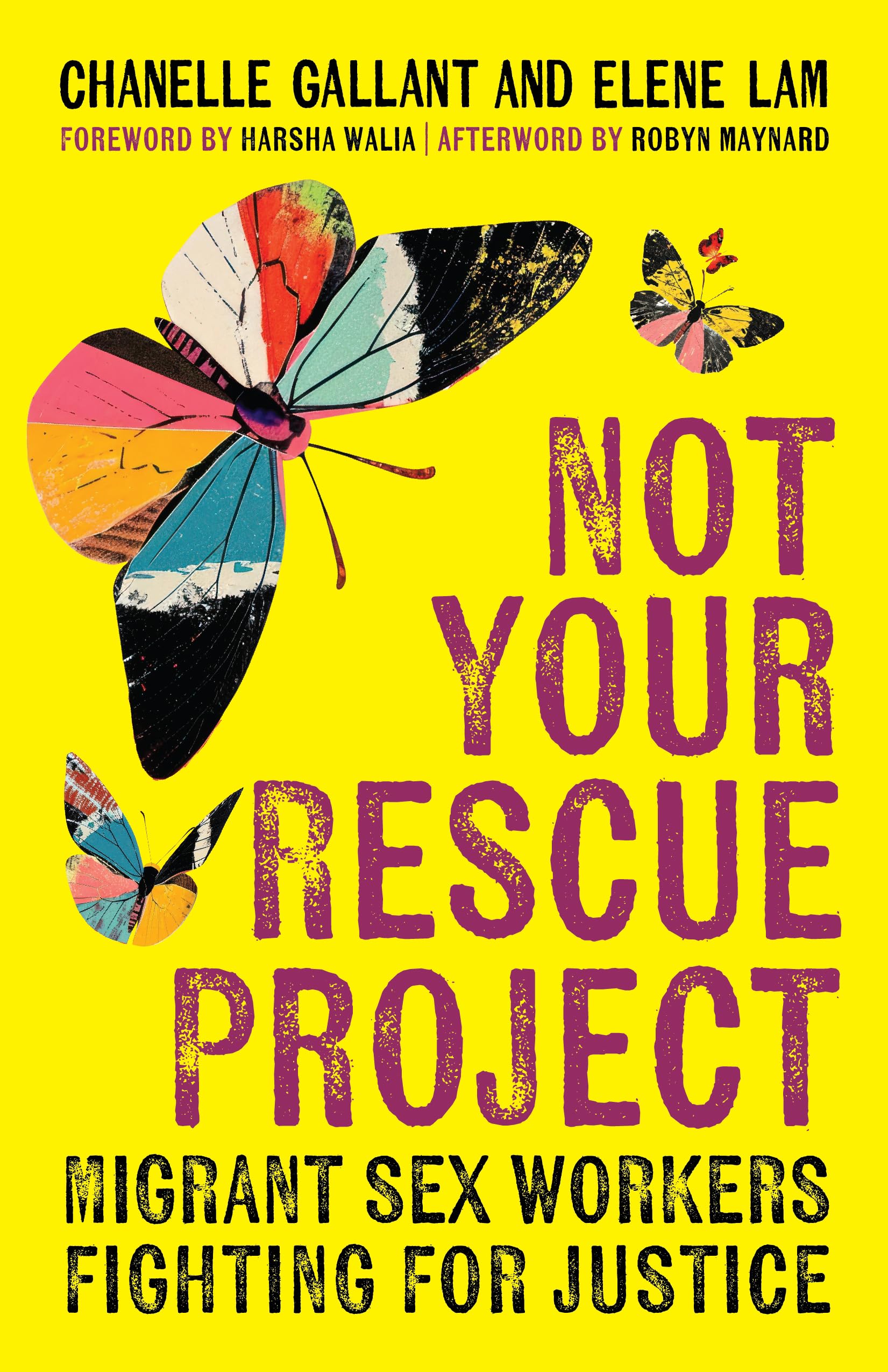I was thrilled to attend the recent book launch of Not Your Rescue Project: Migrant Sex Workers Fighting for Justice by Elaine Lam and Chanelle Gallant. I have admired Gallant’s writing for a long time. As for Lam—the Founder of Butterfly: Asian Migrant Sex Worker Support Network—our paths often cross at sex worker organization events in Toronto.
The book gives a historical introduction and analysis of Canada’s and America’s longstanding history of racism towards Asian women, with laws that prohibited their immigration, and that were designed to punish Asian women more harshly for sex work compared to other demographics.
It’s especially topical right now as we’re currently in what’s known as 16 days of Action against Gender-Based Violence. This movement is objectively good and important, but is also highly problematic as many governments, mainstream feminist non-profits, and even the UN continues to conflate sex work with human trafficking. This puts sex workers at risk of criminalization via municipal bylaws, increased police funding and immigration scrutiny, which in turn subject migrant sex workers to real harms, including state violence and deportation.
It also discusses the UN’s Palermo Protocol, which has been criticized by the authors and many other scholars as negating sex workers’ consent. Like many modern anti-trafficking laws and policies worldwide, the Palermo report makes the position that sex work is inherently violent and exploitative, thus all sex workers are victims, and positions law enforcement agencies as qualified to save them.
Lam and Gallant painstakingly and elegantly refute this narrative:
“This is why, instead of the terms modern slavery, sex trafficking, or human trafficking, we use language that accurately describes the problems facing migrant sex workers and holds the right people and institutions accountable—terms like police abuse, sexual assault, poor working conditions, workplace discrimination, intimate partner violence, and client violence. Many of the problems sex workers face fall into three types—state violence, intimate partner violence and poor working conditions.”
This distinction above, arrived at through specific use of language, alone made this book worth reading. The authors outline the hallmarks of the anti-trafficking moral panics, those elements include that sex workers are subject to violence, that their money is taken from them by an abusive third party who keeps them under lock and key. Then, they compare them to what happens during a police or bylaw raid on massage parlours. Often, these types of raids are disguised as operations to rescue sex workers.State agents arrive, often abuse the workers, the state confiscates their money, imprisons them and often deports them to a country with poorer economic and political conditions than in the global West.
Back in 2023, I attended a meeting with Prof. Tomoya Obokata, the UN Special Rappourteur Special Rapporteur on Contemporary Forms of Slavery as part of York’s University Critical Trafficking and Sex Work studies cluster. The cluster’s researchers work with sex worker led organizations, Butterfly being one of them, on policies to resist the sex work as human trafficking discourse. We were all thrilled when Prof. Obokata actively listened to, and highlighted our concerns with this current model in his final report.
“Policies and discourse related to preventing and addressing contemporary forms of slavery in Canada inappropriately conflate commercial sexual exploitation and consensual adult sex work, which negatively impacts the rights of sex workers and deflects focus from persons experiencing contemporary forms of slavery…sex workers reported that they cannot safely engage with law enforcement personnel, who routinely surveil and harass them and raid their workplaces under the guise of anti-trafficking operations. Law enforcement personnel reportedly ignore or minimize their complaints of violence or exploitation, focusing on criminalizing sex workers or their clients. Law enforcement actors may also sexually exploit sex workers that attempt to bring complaints before them. Sex workers from communities that are already overpoliced, including Indigenous and racialized sex workers and LGBTQ+ sex workers, face even greater discrimination.”
However, at the same time as Prof. Obokata’s report, UN Special Rapporteur on Violence Against Women and Girls, Reem Alsalem was also travelling the world to consult with government agencies, scholars and communities. This report reiterates the dominant narrative that sex work is inherently exploitative and encourages criminalisation of sex work. Alsalem defends her choice of using prostitution instead of sex work at length by saying “the term wrongly depicts prostitution as an activity as worthy and dignified as any other work.” The report actively recommends that governments constitute to criminalise sex work by encouraging them to “adopt the abolitionist legal framework.”
Not Your Rescue Project dispels these myths step by step, time and time again. It also addresses what it refers to as the Anti-Trafficking Industry, and how even the most well meaning organizations such as the UN perpetuates harm and puts migrant sex workers at risk of state violence.
At the book launch, there was discussion about Donald Trump’s recent election win making him the new President of the United States of America, and Canadian Prime Minister Justin Trudeau’s lowering of immigration targets—both Lam and Gallant were quick to point out that migrant sex workers’ struggles and resistance bring valuable grassroots organising skills to the table in todays’ climate of rising populism. Gallant said “the local massage parlour at the local strip mall is already resisting against fascism and authoritarianism”. In writing a book about migrant sex worker justice, the authors bestowed upon us a unique and precious gift: a blueprint on how to organise against racist laws and fight for (im)migrant justice in upcoming years.
Not Your Rescue Project is an excellent starting point for anyone who is interested in learning about critical criminology and (im)migrant justice, but doesn’t know where to start, or doesn’t have the patience to read purely academic work, which is often dry and overly full of academic jargon.
If you’re wondering how you can support the ongoing 16 days Activism against Gender-Based Violence, then I implore you to check out Butterfly’s work and efforts here, where you can also donate: https://www.butterflysw.org/donate.




